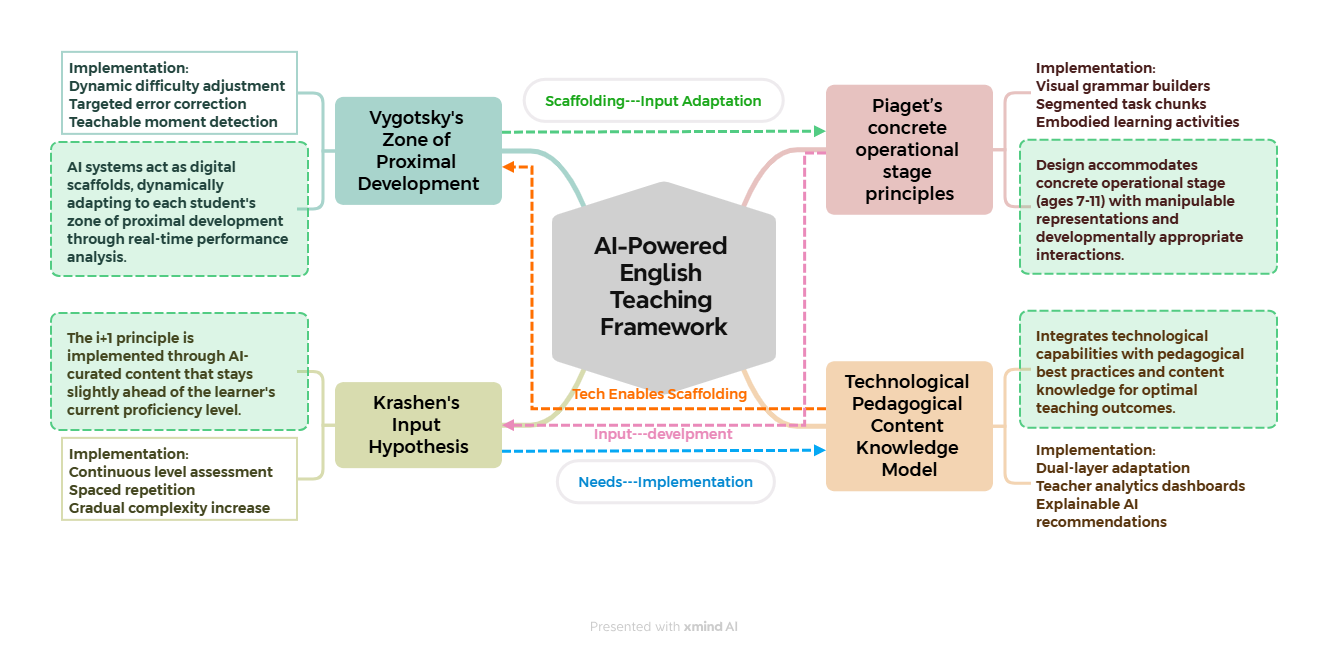AI-Powered Personalized English Teaching for Primary Students: Strategies and Outcomes
Keywords:
Artificial Intelligence, Personalised Learning, English Teaching, Primary Education, Adaptive LearningAbstract
Personalised teaching has emerged as a transformative approach in modern English language instruction, with AI technologies playing an increasingly pivotal role. The present study investigates the application of AI in the development of personalised English teaching strategies for primary students, thus addressing the growing need for adaptive and individualised learning solutions. The present study employs a mixed-methods approach, combining data analysis from AI-powered platforms with qualitative insights from interviews with educators. The findings of the study demonstrate that AI-driven personalisation significantly improves student engagement, language acquisition, and cognitive development in English learning. These findings contribute to both theoretical advancements in language education and practical applications of AI in pedagogical settings. The study concludes with the presentation of evidence-based recommendations for the optimisation of AI integration in personalised English instruction. These recommendations are twofold, namely that educational equity should be AI-enabled and that student welfare should be safeguarded. This research is of particular significance for the advancement of modern language teaching methodologies in the era of intelligent education.
References
H. Zhang & S. Wang (2022). “The impact of AI on modern education models.” Journal of Educational Development, 43(12), pp. 58-64.
J. Li, et al. (2023). “Intelligent education policy in China: Implementation progress and future directions.” China Educational Technology, 412(7), pp. 1-8.
X. Chen, & Y. Liu (2021). “Challenges and countermeasures in primary English teaching.” Modern Primary Education, 38(5), pp. 45-49.
M. Zhou (2022). “Adaptive learning technologies for young learners.” Contemporary Educational Technology, 13(4), pp. 401-410.
T. Wang, et al. (2023). “Personalised learning in primary English: An AI-driven approach.” e-Education Research, 44(2), pp. 76-83.
L. Huang & R. Zhang (2022). “AI applications in language education: A meta-analysis.” Educational Technology Research, 40(3), pp. 112-125.
Q. Yang (2023). “Research trends in AI-enhanced language learning.” Foreign Language Education in China, 16(1), pp. 34-41.
H. Zhang, & M. Li (2021). “System Design and Effectiveness Research of AI-assisted English Pronunciation Training.” China E-Education, (5), pp. 67-73.
L. Chen & W. Liu (2023). “Empirical Research on the Challenges of AI Application in Basic Education: Based on a Survey of 312 Schools.” Educational Technology Research, 44(1), pp. 45-51.
Y. Liu (2023). “Research on the Impact of Intelligent Writing Feedback Systems on Junior High School Students’ English Writing Ability.” Foreign Language Computer Assisted Instruction, (2), pp. 56-62.
G. Yang, H. Zhou, & M. Wu (2023). “Development and Application of an Emotion-Aware Intelligent Tutoring System for Primary School English.” Open Education Research, 29(2), pp. 112-120.
W. Zhang & X. Li (2023). “Research on the Application of Intelligent Tutoring Systems in College English Teaching.” Journal of Educational Technology, 2023(4), pp. 56-63.
L. Wang, et al. (2024). “Impact of Adaptive Learning Systems on English Vocabulary Acquisition.” Modern Foreign Language Teaching, 2024(2), pp. 34-41.
National Education Big Data Centre (2024). “Accuracy Report of AI Writing Evaluation Systems.” China Educational Technology, 2024(3), pp. 12-18.
H. Chen, & Y. Liu (2023). “Effectiveness of AI Speech Recognition in English Pronunciation Correction.” Foreign Language Education Technology, 2023(5), pp. 78-85.
G. Yang (2024). “Disparities in AI Education Adoption in Vocational Colleges.” Vocational and Technical Education, 2024(3), pp. 78-85.
Y. Li, & H. Zhou (2024). “Limitations of AI Writing Evaluation Systems in Identifying Discourse Errors of Chinese Learners.” Foreign Language Teaching and Research, 2024(1), pp. 45-53.
Y. Su (2024). “Practical Approaches to AI-Empowered Personalised College English Teaching”. Modern English, (24), pp.48-50.
L. Zhang, & Q. Li (2024). “Optimisation of English Learning Resource Recommendation Algorithms Based on Deep Learning”. China Educational Technology, (3), pp.78-85.
M. Chen (2024). “Constructing a Multidimensional Evaluation Model for English Learning”. Foreign Language World, (2), pp.67-74.
X. Wang, et al. (2023). “Research on AI Teaching Competency Development for University Instructors”. E-Education Research, (6), pp.45-52.
Yu Su (2024). “Research on the Construction of Personalised Teaching Strategies for College English Based on AI.” Modern English, 24(2024), pp.48-50.


